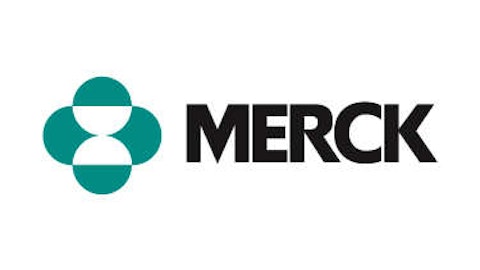Gemzar + Platinol: The combination of Eli Lilly & Co. (NYSE:LLY)‘s Gemzar (which can now be found in multiple generic forms since it went off patent in late 2010) and Platinol (cisplatin) is a common chemotherapy combo used to treat bladder cancer when radiation isn’t used, or if it’s progressed into the metastatic state. In cases where radiation is administered in addition to chemotherapy, patients will often just be given a course of Platinol by itself. In a clinical trial conducted in 2000 on patients with metastatic bladder cancer, the findings showed that Gemzar + Platinol provided a similar survival profile to MVAC (described below), while offering a more favorable safety and tolerability profile .
MVAC: MVAC is actually a combination of four drugs: Trexall (methotrexate), Velban or Velsar (vinblastine), Adriamycin (doxorubicin), and Platinol (cisplatin). The combination has been shown to slow the progression of the disease and even halt it in its track on certain occasions, but it can also have nasty side effects including anemia, kidney problems, and high risk of infection, to name a few. In that same study from the year 2000 that I listed above, grade 3/4 neutropenia, neutropenic fever, and neutropenic sepsis was significantly higher in the MVAC arm.
Valstar: Made by Endo Health Solutions Inc (NASDAQ:ENDP)‘s pharmaceutical segment, Valstar is a drug targeted at patients with in-situ carcinoma who’ve tried BCG treatment but have been unresponsive, and who are also unable to receive a cystectomy (removal of the bladder). The response rate for Valstar was 18% in trials, and it resulted in 26% sales growth for the company in 2012 to $27.1 million.
Like all the previous cancer types that we’ve delved into over the previous five weeks, bladder cancer has had a promising drug flop in trials. Spectrum Pharmaceuticals, Inc. (NASDAQ:SPPI) , for example, announced last year that Apaziquone, which was being tested as a post-operative treatment for low-risk, non-invasive bladder cancer, failed to reach its primary endpoint of reducing tumor reoccurrence in both of its late-stage trials. All hope isn’t lost as the company may meet with the FDA to discuss the drug’s future, but no immediate hope for approval exists, either!
What’s coming down the pipeline
With fewer people smoking, the biggest risk factor for acquiring bladder cancer has basically leveled off its occurrences in men, while women are seeing a small annual decline in occurrences. Still, research is underway to deliver new medicines to treat bladder cancer and extend patient quality of life and survival. Here are a few examples that have a chance to move the needle in the patients’ favor; and, you’ll notice, some of these names may appear quite familiar.
Sutent: Pfizer Inc. (NYSE:PFE)‘s Sutent — which is already approved by the FDA to treat advanced pancreatic cancer, renal cell carcinoma, and gastrointestinal stromal tumors — could be an effective agent at fighting bladder cancer. In trials, Sutent was tested alone, and in combination with Gemzar and Platinol and was found, in the combination arm, to increase certain targeted regulator expression and result in cancer cell death. The result is that Sutent could possess significant anti-tumor activity and could gain an additional indication for bladder cancer down the road.
Avastin: Don’t even try to act surprised that you see Roche‘s Avastin on this list as a potential bladder cancer treatment. The drug, which works by inhibiting blood vessel growth and thus starving the tumor, is being studied in combination with Gemzar and Platinol as a treatment for metastatic bladder cancer.
DN24-02: Dendreon Corporation (NASDAQ:DNDN)‘s immunotherapy treatment targeting HER2-expressed bladder cancer might be the most intriguing. Similar to how Provenge removes white blood cells from a patients’ body, exposes them to a protein that “teaches” them to recognize and attack a cancer cell, and then reinjects them back into a patient’s prostate, Dendreon Corporation (NASDAQ:DNDN) is working on a long-term midstage study that will determine if its immunotherapy injections can be used to treat bladder cancer. The trial was initiated in 2011, but won’t be completed until June 2016.
Your best investment
As you might have guessed, I’m honestly disappointed with the scope of advances in bladder cancer over the previous four decades. For the most part, global cancer chemotherapy combinations are still the go-to when surgery is not an option.
In terms of investments, if you wanted to take a gamble I’d say that Dendreon’s immunotherapy platform should demonstrate the efficacy and safety needed to gain approval in bladder cancer. The concerns I have which every investor should be aware of are that the long-term trial data won’t be available for at least another three years, and that pricing of the treatment could potentially scare physicians away from using the immunotherapy — that’s what happened with Provenge and it could happen here, too.
If you’re looking for the safest way to play the bladder cancer sector, with so many of the chemotherapy agents being used now off patent, I’d have to go with Endo Health Solutions Inc (NASDAQ:ENDP) and Valstar. $27 million in annual sales may not seem like much, but the growth rate has been phenomenal and it hasn’t shown any signs of slowing.
Stay tuned next week when we tackle to current and upcoming therapies for the treatment of non-Hodgkin’s lymphoma in this Tackling Cancer series.
The article Tackling Cancer: Bladder Cancer’s Biggest Current & Upcoming Players originally appeared on Fool.com.
Fool contributor Sean Williams has no material interest in any companies mentioned in this article. You can follow him on CAPS under the screen name TMFUltraLong, track every pick he makes under the screen name TrackUltraLong, and check him out on Twitter, where he goes by the handle @TMFUltraLong.The Motley Fool owns shares of Dendreon
Copyright © 1995 – 2013 The Motley Fool, LLC. All rights reserved. The Motley Fool has a disclosure policy.


